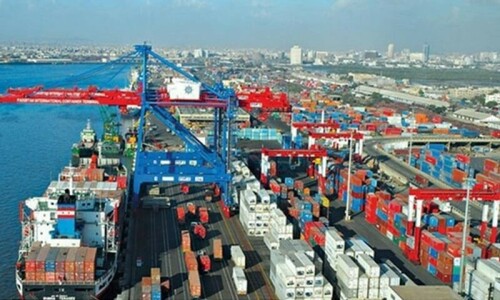DUBAI: Slumping oil prices will not halt a massive ramp-up in Gulf infrastructure spending, as rich nations deploy huge reserves to maintain a breakneck development pace and the rest turn to buoyant funding markets.
However, states are being urged to consider the most effective funding mix for these schemes in the longer term, especially against a backdrop of lower oil prices.
The World Bank estimates up to $500 billion will be spent by Gulf countries on infrastructure by 2020, as governments seek to improve the lives of citizens and create jobs.
With trillions of dollars of reserves between them, Saudi Arabia, Abu Dhabi and Qatar have been increasingly by-passing banks due to frustration at the time it takes to get funding.
In Qatar, “more reliance on self-financing supported by large fiscal surpluses” pushed outstanding credit to the public sector down 3.7 per cent between January and August, according to the Ministry of Development Planning and Statistics.
“We fund infrastructure projects by the state of Qatar and we try to give the opportunity also to the private sector on some of the opportunities,” Economy Minister Sheikh Ahmed bin Jassim al-Thani told Reuters on the sidelines of an investment event in London.
Gulf infrastructure loans totalled $8.94bn in the first nine months of 2014, compared with $16.12bn in 2013, according to data from Project Finance International, a Thomson Reuters unit.
In the past, large-scale projects such as Qatar’s Barzan gas scheme and Saudi’s Sadara chemicals complex had most of their total costs, worth $10bn and $20bn respectively, covered by debt.
But now, schemes like the Riyadh metro, costing $22.5bn, and the UAE’s first nuclear power plant, totalling $20bn, are being fully or majority paid for by the state.
RESERVES: Such enormous burdens might seem untenable when Gulf states may face a sustained period of lower oil prices, which have almost halved since June.
The International Monetary Fund (IMF) has also warned some Gulf nations must reduce public spending to avoid burning through their savings.
But governments are now prioritising infrastructure spending and some have methods to avoid the budgetary squeeze.
Saudi funds some of its large infrastructure projects off-budget from a separate central bank account, which contained 514bn riyals in October.
Both Kuwait’s finance minister and the UAE’s economy minister were quoted this week as saying reserves would maintain spending on development projects despite falling oil prices.
Using savings for infrastructure seems logical as surplus cash has been put into sovereign wealth funds for years, on the basis that hydrocarbon riches need to last.
The meagre interest rate much of this money attracts currently — Saudi is estimated to invest most of its reserves in low-yielding US Treasuries — could arguably be better spent on infrastructure.
Published in Dawn, December 19th, 2014















































Dear visitor, the comments section is undergoing an overhaul and will return soon.